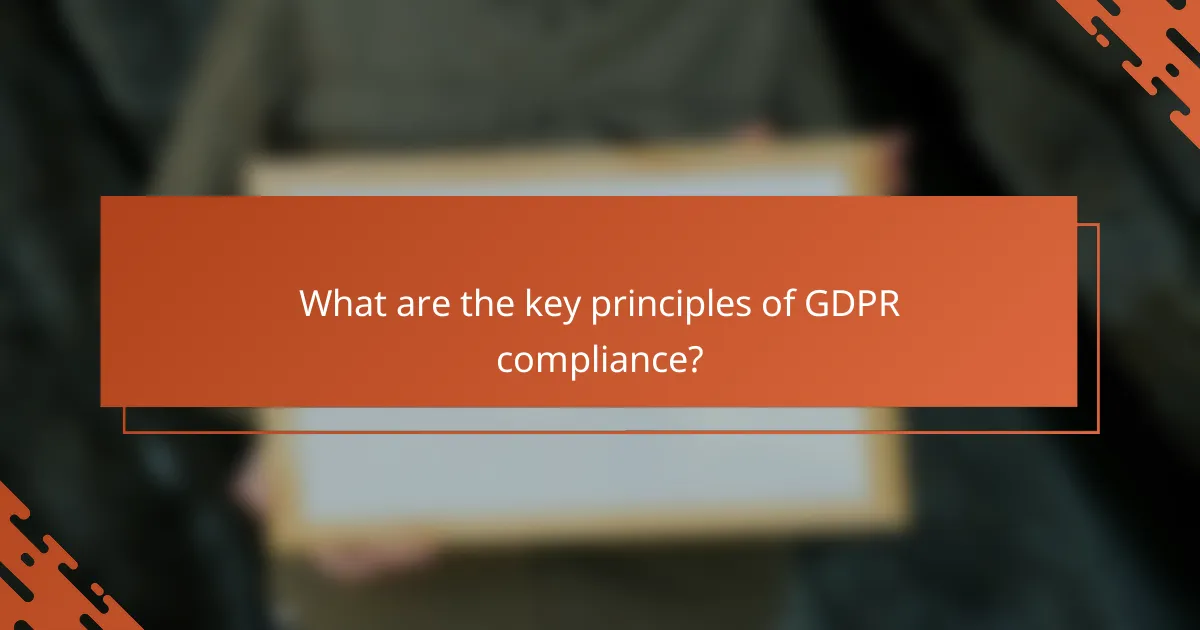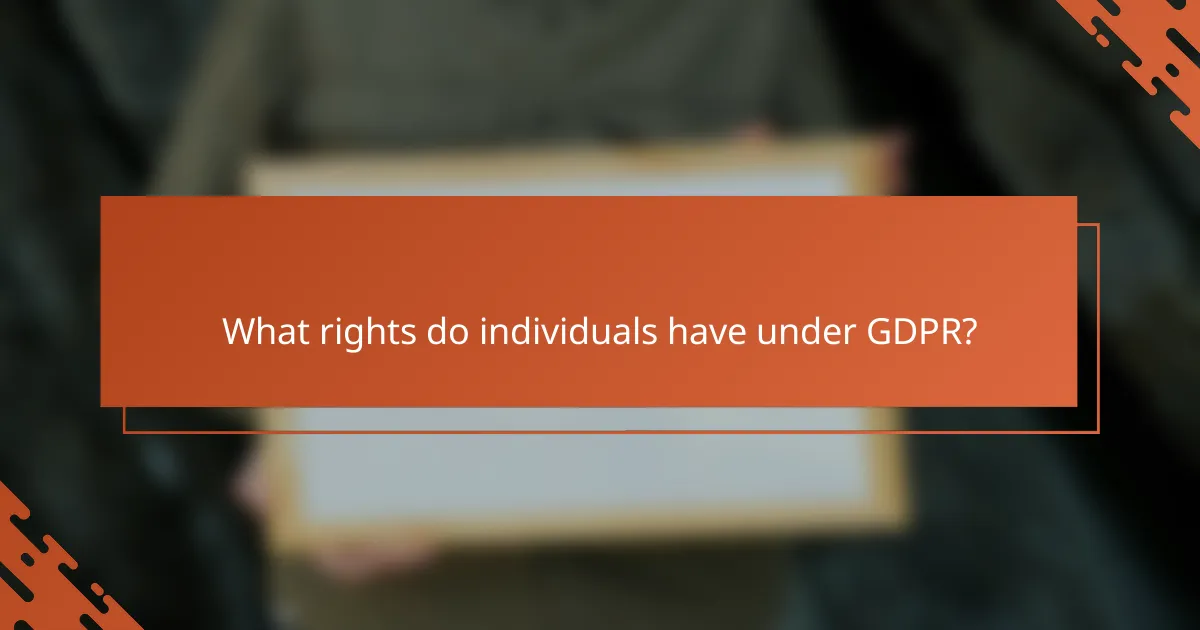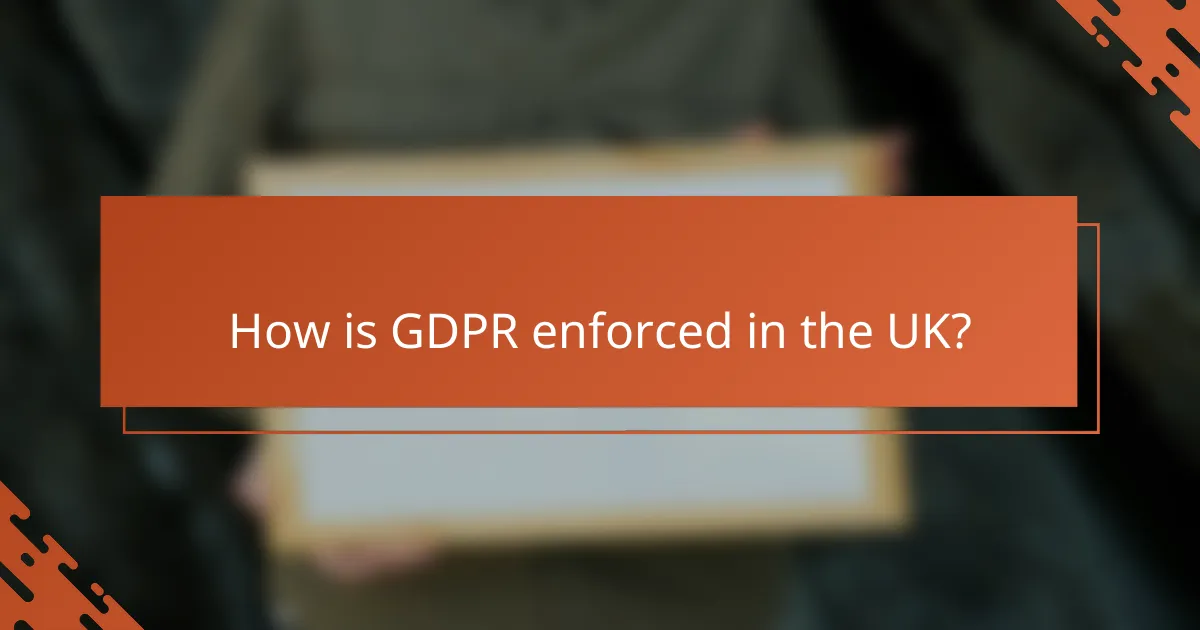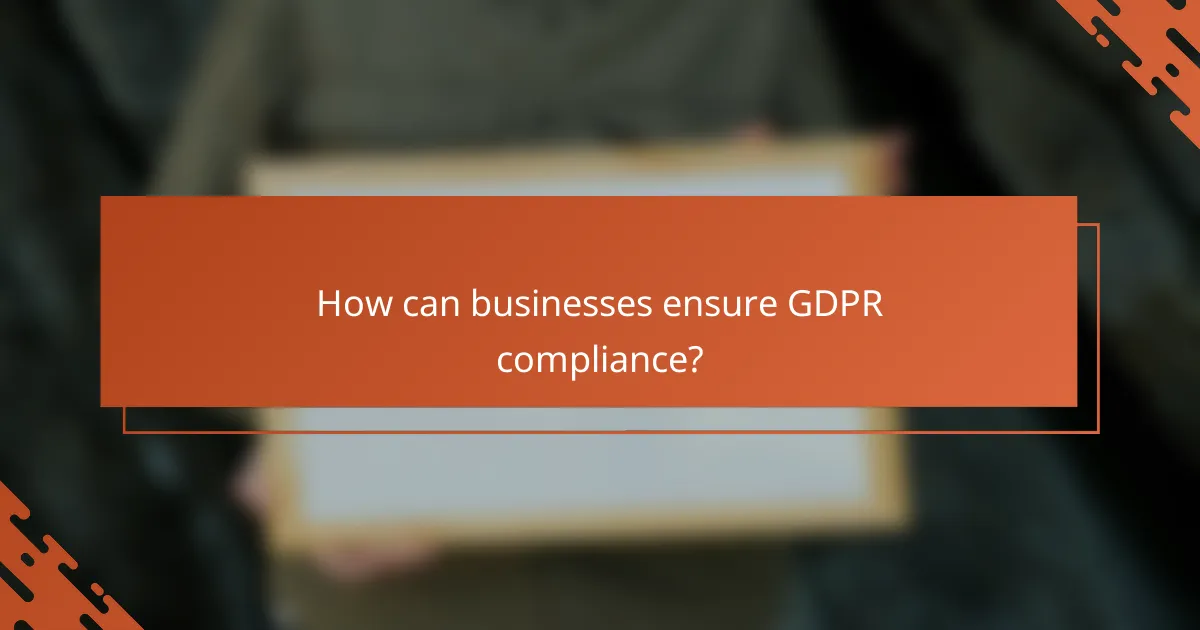The General Data Protection Regulation (GDPR) establishes key principles aimed at safeguarding personal data and ensuring that individuals’ rights are respected. These principles guide organizations in their handling of personal information, emphasizing the importance of accountability and transparency. Additionally, individuals are granted specific rights under GDPR that empower them to control their data, while enforcement is overseen by the Information Commissioner’s Office (ICO) in the UK, which ensures compliance and addresses violations.

What are the key principles of GDPR compliance?
The key principles of GDPR compliance focus on protecting personal data and ensuring individuals’ rights are upheld. These principles guide organizations in how they collect, process, and store personal information, emphasizing accountability and transparency.
Data protection by design
Data protection by design requires organizations to integrate data protection measures into their processing activities from the outset. This means considering privacy and security at every stage of product development and service delivery, rather than as an afterthought.
For example, when developing a new app, companies should implement encryption and access controls to safeguard user data before launch. This proactive approach helps mitigate risks and ensures compliance with GDPR from the beginning.
Accountability and compliance
Accountability and compliance entail that organizations must demonstrate their adherence to GDPR principles. This includes maintaining records of processing activities, conducting impact assessments, and appointing a Data Protection Officer (DPO) when necessary.
Organizations should regularly review their data protection practices and policies to ensure they remain compliant. Keeping detailed documentation can help in demonstrating accountability during audits or investigations.
Data minimization
Data minimization means that organizations should only collect and process personal data that is necessary for their specific purposes. This principle encourages limiting data collection to what is essential, reducing the risk of exposure and misuse.
For instance, if a business only needs an email address for a newsletter, it should not request additional information such as phone numbers or addresses. This practice not only complies with GDPR but also builds trust with users.
Purpose limitation
Purpose limitation dictates that personal data must be collected for specified, legitimate purposes and not further processed in a way that is incompatible with those purposes. Organizations should clearly define and communicate the reasons for data collection to users.
For example, if a company collects data for customer support, it should not use that data for marketing without obtaining additional consent. Adhering to this principle helps maintain transparency and user trust.
Transparency and fairness
Transparency and fairness require organizations to be open about their data processing activities. This includes providing clear information to individuals about how their data will be used, who it will be shared with, and their rights regarding their data.
Organizations should use straightforward language in privacy notices and ensure that users can easily access this information. This approach fosters a sense of fairness and empowers individuals to make informed decisions about their data.

What rights do individuals have under GDPR?
Under the General Data Protection Regulation (GDPR), individuals have several rights designed to protect their personal data. These rights empower individuals to control how their data is collected, used, and shared by organizations.
Right to access personal data
The right to access personal data allows individuals to request and obtain a copy of their personal information held by an organization. This includes details about how and why their data is being processed.
Organizations must respond to access requests within one month, and they can charge a fee only if the request is manifestly unfounded or excessive. Individuals should clearly specify the data they wish to access to streamline the process.
Right to rectification
The right to rectification enables individuals to request corrections to inaccurate or incomplete personal data. This ensures that the information organizations hold is accurate and up-to-date.
Requests for rectification should be made directly to the organization holding the data, which must act on the request without undue delay, typically within one month. Providing supporting documentation can help facilitate the correction process.
Right to erasure
Also known as the “right to be forgotten,” the right to erasure allows individuals to request the deletion of their personal data under certain circumstances. This right is applicable when the data is no longer necessary for the purposes for which it was collected or if consent is withdrawn.
Organizations must evaluate each request and respond within one month. However, they may refuse requests if the data is needed for compliance with legal obligations or for the establishment, exercise, or defense of legal claims.
Right to data portability
The right to data portability allows individuals to obtain and reuse their personal data across different services. This right applies when the data is processed by automated means and is based on consent or a contract.
Individuals can request their data in a structured, commonly used, and machine-readable format. Organizations must ensure that the transfer of data is secure and efficient, facilitating easier movement between service providers.
Right to object to processing
The right to object to processing gives individuals the ability to challenge the processing of their personal data for specific purposes, such as direct marketing. This right is especially relevant when the processing is based on legitimate interests or public tasks.
Individuals can exercise this right by informing the organization of their objection, which must be addressed promptly. Organizations must stop processing the data unless they can demonstrate compelling legitimate grounds that override the individual’s interests or rights.

How is GDPR enforced in the UK?
GDPR enforcement in the UK is primarily managed by the Information Commissioner’s Office (ICO), which oversees compliance and handles violations. The ICO has the authority to investigate complaints, impose fines, and ensure that organizations adhere to data protection regulations.
Role of the Information Commissioner’s Office (ICO)
The ICO is the UK’s independent authority set up to uphold information rights. It provides guidance on GDPR compliance, investigates breaches, and has the power to take enforcement actions against organizations that fail to comply with the regulations.
Organizations can consult the ICO’s resources for best practices in data handling and to understand their obligations under GDPR. The ICO also conducts audits and can issue warnings or reprimands to non-compliant entities.
Penalties for non-compliance
Penalties for failing to comply with GDPR in the UK can be severe, with fines reaching up to £17.5 million or 4% of annual global turnover, whichever is higher. This tiered approach means that the severity of the penalty depends on the nature and gravity of the violation.
Organizations should be aware that non-compliance can also lead to reputational damage and loss of customer trust, which can have long-term financial implications. Regular audits and staff training can help mitigate these risks.
Reporting data breaches
Under GDPR, organizations must report data breaches to the ICO within 72 hours of becoming aware of the incident. This requirement emphasizes the importance of having robust data monitoring and incident response plans in place.
In addition to notifying the ICO, organizations may also need to inform affected individuals if the breach poses a high risk to their rights and freedoms. Clear communication and prompt action are crucial in managing the fallout from a data breach.

What are the implications of GDPR for businesses in Europe?
The General Data Protection Regulation (GDPR) imposes strict rules on how businesses in Europe collect, store, and process personal data. Compliance is essential to avoid significant fines and to maintain customer trust.
Impact on marketing strategies
GDPR requires businesses to obtain explicit consent from individuals before processing their personal data for marketing purposes. This means that companies must be transparent about how they use data and provide clear options for users to opt-in or opt-out.
As a result, marketing strategies may need to shift towards more personalized and consent-based approaches. Businesses should consider using data analytics to understand customer preferences while respecting privacy regulations.
Changes in data handling practices
Under GDPR, businesses must implement robust data handling practices, including data minimization and purpose limitation. This means only collecting data that is necessary for specific purposes and ensuring it is used accordingly.
Additionally, organizations must establish procedures for data access requests and ensure that personal data is securely stored and processed. Regular audits and employee training on data protection are also crucial to maintaining compliance.
Need for data protection officers
Many businesses are required to appoint a Data Protection Officer (DPO) to oversee GDPR compliance. The DPO is responsible for monitoring data handling practices, ensuring adherence to regulations, and serving as a point of contact for data subjects and regulatory authorities.
Having a DPO can help organizations navigate the complexities of GDPR and mitigate risks associated with data breaches. Companies should evaluate their data processing activities to determine if a DPO is necessary based on the scale and nature of their operations.

How can businesses ensure GDPR compliance?
Businesses can ensure GDPR compliance by implementing structured processes that address data protection principles, rights of individuals, and enforcement mechanisms. This involves regular audits, clear privacy policies, and employee training to foster a culture of data protection.
Conducting data audits
Data audits are essential for identifying what personal data a business holds, how it is processed, and where it is stored. Regular audits help ensure that data handling practices align with GDPR requirements and can reveal areas needing improvement.
To conduct an effective audit, businesses should create an inventory of personal data, categorize it by type and purpose, and assess compliance with GDPR principles. This process can be done annually or bi-annually, depending on the volume of data processed.
Implementing privacy policies
Clear and comprehensive privacy policies are crucial for informing individuals about how their data is collected, used, and protected. These policies should be easily accessible and written in straightforward language to ensure understanding.
When drafting privacy policies, businesses should include details on data collection methods, processing purposes, retention periods, and individuals’ rights under GDPR. Regular updates to these policies are necessary to reflect any changes in data handling practices or legal requirements.
Training employees on data protection
Training employees on data protection is vital for fostering a culture of compliance within an organization. Employees should understand GDPR principles, their roles in data protection, and the importance of safeguarding personal information.
Training sessions can vary in format, including workshops, online courses, or regular briefings. It is recommended to conduct training at least once a year and whenever there are significant changes in data processing practices or regulations.
